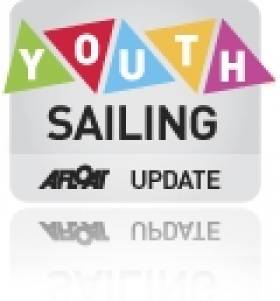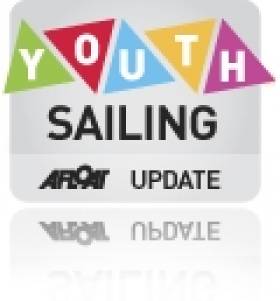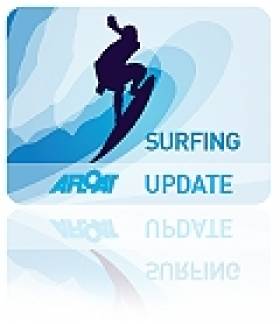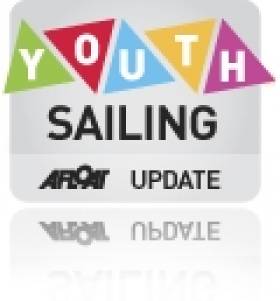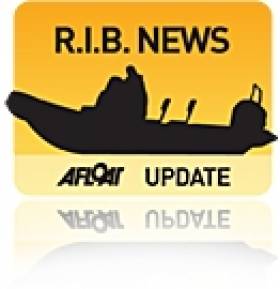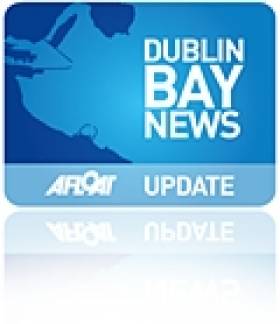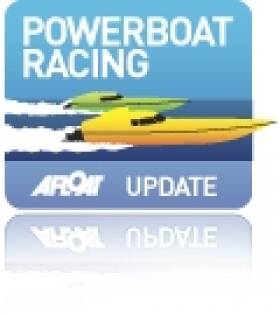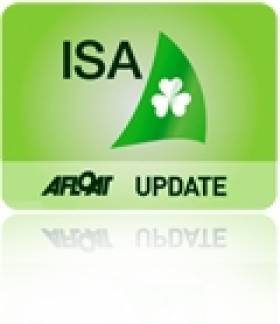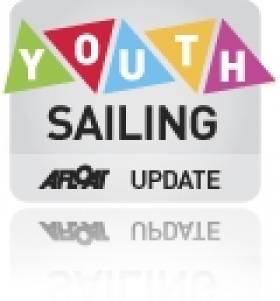Displaying items by tag: ISA
Junior All Ireland championships Postponed
ISA Junior & Girls All Ireland Sailing Championships
Each competitor will sail with one crew member of their choice in one of the nine Fireflies. On Saturday the teams will be separated into two flights (groups) and will sail three races each. The same flights will then sail an additional two races on Sunday with the top three teams in each flight progressing through to the medal race.
The 18 competitors taking part in the 2011 ISA Junior & Girls All Ireland Sailing Championships are:
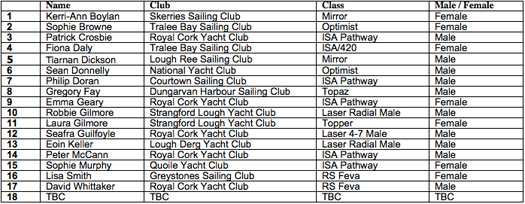
Nice to be Invited to the All Ireland Sailing Championships
Wayfarer Dinghy National Champion Trevor Fisher was not invited to sail in last weekend's Waterway's Ireland ISA All Ireland Sailing Championships. Here he outlines why and suggests the system for participation in 'Ireland's most prestigious sailing event' needs an overhaul. (First published: 12th October 2011)
For many people, the opportunity to sail in an event such as the 'Waterways Ireland All Ireland Sailing Championships' would be welcome, for some it would be the highlight of the summer sailing season. Why would it not be welcome? You have the chance to sail against some of the best sailors in the country, Olympic competitors, sailors who race week in, week out and work hard to promote their classes and develop sailing on the island. How does that opportunity come about? Previous winners include some of the best dinghy sailors that Ireland has produced, and without doubt, all winners of the event have been worthy champions.
In years gone by, participation in the event appeared to be straightforward – you won your class national championships and were invited by the ISA. In recent years, the event seems to have changed. It is now appears to be predominantly sailed for by keelboat sailors and the nomination / invitation process is unclear. Classes with 4 Irish based boats at their national championships were invited and represented, but other classes with higher attendance figures were not invited (but were nominated). This year, 2 of the 16 invitees won their dinghy classes national championships and were invited - many dinghy class national champions were not invited to take part. Invitees included the 3rd placed and 8th placed helm from 2 dinghy classes but not winners of other dinghy class national championships.
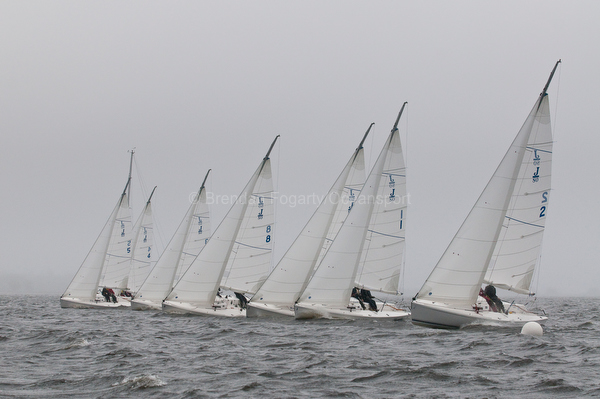
Racing at the All Ireland Sailing Competition. Photo: Brendan Fogarty
Interestingly, on the Yachts & Yachting home page today, 10th October, the ISA All Ireland Championship is included in the KEELBOAT NEWS section of the website. Of the 16 participants in this year event, 10 were invited from keelboat classes, one from multihulls, one as an Olympic invite and 4 from dinghy classes. Is this reflective of the current state of racing in the country? Perhaps it is. Is it reflective of the current state of dinghy racing in the country – I don't think so. The UK equivalent of the ISA All Ireland Championship is the highly prestigious 'Endeavour Trophy', sailed for by the winners of many dinghy national championships in the UK. No keelboats are invited. Is it time for a change? I don't know. Is it time for a debate......I believe so.
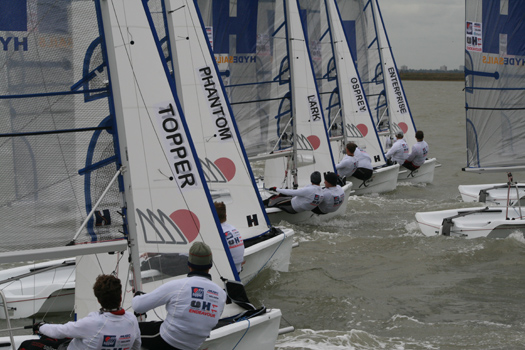
A start at this year's Endeavour trophy. Photo: Sue Pelling
So why am I asking these questions? Is this 'sour grapes' on my part? – It looks like it! Am I just a disgruntled dinghy sailor with a chip on my shoulder – possibly! Do I think the process for taking part in the event is not equitable and transparent? - Yes. A number of people that I have spoken to feel the same way and have asked many of the questions that I ask here. I don't begrudge any of this years invitees the opportunity of taking part, but would like the ISA's process for issuing invites clarified. There should be a transparent and equitable process.
So...there is a background. Many years ago, I raced a variety of classes and sailed in the Helmsman's Trophy (as the All Ireland Championship was then called) as both helm and crew. It was always a prestigious event, with the majority of participants coming from dinghy classes. All of the previous winners have been talented racers, from a range of classes.
I returned to sailing three years ago and now race Wayfarers in my local club. Having won the national Championships in 2010, I was nominated for the All Ireland Championships. I was not invited and was informed by the ISA that the only reason was that the Wayfarers didn't use an ISA National Race Officer for their event. The Notice of Race makes it clear that championships should be run under the management of an ISA National Race Officer (although classes not in compliance with this provision may be included in a later draw for invitations). I clarified that this was the sole reason that the Wayfarer class did not get an invite and this was confirmed – fair enough – the ISA have rules and I now knew the process for the following year!
In 2011, the Wayfarer class sailed a joint UK and Irish National Championships as part of the Volvo Dun Laoghaire regatta. This was a fantastic event, well, with 30 boats taking part. The Wayfarers were the biggest dinghy class, second biggest one design fleet (SB3s had a few more boats) and third biggest fleet (IRC 3) had a few more boats. Again, I won the Irish Nationals and was nominated to take part, but did not receive an invite. When I sought clarification, I was told that the Wayfarers only had three Irish boats competing in the fleet of 30, which is not the case. 11 Irish boats took part, including 3 from Greystones SC, one from Cullaun SC, one from Dun Laoghaire and 6 from East Down YC. Although the Wayfarer is affiliated to the Irish Sailing Association, it appears that the 6 boats from East Down YC are not classed as Irish boats, despite being members of the Irish branch of the Wayfarer association, affiliated to the ISA. This had not been an issue in 2010, when there was a larger contingent from EDYC in the Wayfarer nationals.
On the 29th September, the ISA website stated the following:
All Ireland Sailing Championships, Royal Cork's Nicholas O'Leary will not be defending the title when the 2011 event is sailed in two weeks time. Names of the 16 invitees, drawn from dinghy and keelboat classes, were published today. Among those attending is O'Leary's father Anthony representing Cruiser Class Zero and his Crosshaven club mate, the 2011 1720 National Champion Mark Mansfield, a past winner of the event.
Nicholas O'Leary is one of 12 invitees – either national champions or top ranked sailors – who are unavailable to attend. Only 16 of 28 invitees had accepted the invitation by last week's entry deadline.
I would like the ISA to give some clarity to a number of issues surrounding the Waterways Ireland ISA Sailing Championships.
I would like the following information:
What is the selection process for issuing invites to the nominated classes (and for determining which nominated classes will not be invited)? Who decides who is invited and what are the criteria for determining this?
Who were the 28 invitees mentioned on the ISA website? Were they all National Champions, who won their class championships (or were the top ranked sailor in the class)?
How many people were nominated, but did not get invites? What classes were these?
Are some classes 'weighted' i.e. is there a requirement for a class to have a certain number of entries at its nationals? Why would one class, with 5 boats at its nationals, get an invite, yet another class with higher attendance, not?
Why were some participants in the event invited, who did not win their national championships (GP14, Fireball), when other winners of national championships were not invited?
Did all of the invitees win a national championship that was run under the management of an ISA National Race Officer? How many invitees were nominated from classes who did not have their national championship run under the management of an ISA National Race Officer? If there were any, why were they nominated ahead of classes who used an ISA National Race Officer?
Why was the event changed from a 3 day to a 2 day event, when there were a number of nominees who had not been invited to take part? In recent years, participants have been aware that the event was run over three days.
The ISA should confirm (or otherwise) that all invitees who attended were nominated before the closing date for nominations and that invitees accepted their invite before the relevant closing date.
Why were classes who had made a nomination not informed that they would not be invited to the event?
How is the number of Olympic nominees determined?
I have been told by the ISA that next year the event will be limited to 16 invites, will be sailed in J80s and will be sailed over 2 days. It is entirely feasible that next year they may be additional Olympic invites, additional keelboat nominations (Puppeteer / Dragon / Etchells / J109 / Sigma / Shipman etc) further reducing the likelihood of active, small classes getting invited to the event. This year, there were no participants from the Laser / Radial / 4.7, 420, 505, Shannon One Design, Mirror, Topper, Topaz, Wayfarer, National 18s, Laser 2000, RS200 and 400. If all of these classes are keen to take part next year, it is inevitable that many top helms, from a range of classes will be unable to take part. Is this a fair way to determine who the 'All Ireland Champion' is?
I believe that the requirement for classes to run their national championships under the management of an ISA National Race Officer should be an aspiration rather than a requirement. It may be difficult for smaller classes to achieve this and there are many competent regional race officers available. If a sailor were to come through an event that was run by someone other than an ISA National Race Officer, and then get the experience of sailing in an event such as the All Ireland Championship, they will likely see the benefit of using more experienced and qualified race officers, but to make it a requirement of small classes, is, in my view detrimental to these classes who are trying to develop their class structure and racing.
Is it time to split the event? Should there be a dinghy and keelboat event? There have always been and always will be discussion surrounding the most appropriate boat to use and this discussion will roll on and on. There are probably lots of valid reasons for using one class or another, but from an outsiders perspective, there is a fleet of 26 TR3.6 dinghies in Schull, recently constructed for the World Team Racing Championships – would these be available for an All Ireland Championships?
The ISA does a lot of work, in a range of areas, and is funded by the Irish Sports Council to do so. According to the Irish Sports Council website, the ISA currently gets over €1 million from the Irish Sports Council, including over €550k is 'High Performance Funding' and over €300k in 'Core Funding'. Surely an organisation that relies so much on the public purse needs to be and appear to be more transparent and equitable in its operation?
I do believe that the All Ireland Championships, which to many is a highlight of the year (Champion of Champions), should have a clearly defined, equitable and transparent process for nominating and inviting helms to take part. This does not appear to have been the case in 2011 and the answers obtained from the ISA to date, combined with the information on the website, have been contradictory and unclear.
Trevor Fisher
Surfers Welcome New Ruling on Doolin Pier Development
Surfers have hailed the recent ruling by An Bord Pleanála that Clare County Council must reapply for planning permission for its proposed €6 million redevelopment of Doolin Pier.
As previously reported on Afloat.ie, local surfers and the Irish Surfing Association (ISA) had expressed dismay over the current development plans – approved by the council earlier this year – which they maintain would result in the destruction of the "world renowned" waves at Doolin Point and Crab Island.
The Irish Times reports that the council must now resubmit its planning application and prepare and environmental impact statement (EIS) due to the potential impact on tidal and wave patterns in the area, setting back plans for at least a year.
The proposed scheme already has support from the local business community and the Doolin Coast Guard unit, which argues that congestion on the pier in peak tourist periods may interfere with rescue efforts.
A spokesperson for the West Coast Surf Club said that both it and the ISA were available "to meet with the council to progress a mutually agreeable design for the pier".
The Irish Times has more on the story HERE.
Youth Boat Selection Requires Leadership
There has been a call for the Irish Sailing Association (ISA) to take a lead in the big decisions that face youth sailors on what classes to sail to after they leave the ranks of the Optimist, Topper and Feva classes. The call comes from a leading junior organiser who does not wish to be named.
Although youth sailing is buoyant in Ireland it is known there is a 'high attrition rate' among teenagers. The lack of transfer in to senior dinghy classes has been a cause of concern for many clubs around the country.
The comments follow a recently published article on Afloat.ie promoting the RS 200 dinghy as a progression boat for juniors.
"We need a class that will keep youths engaged. The 420 and 29er are great boats but require higher levels of boathandling, are much more competitive and tend to attract the top sailors"
"While the ISA's Olympic ambitions are great to see, it will fail the sport as a whole if it does not tackle this gaping need, the organiser says.
Read the RS 200 article by Ciara Byrne and the junior organiser's comments here
Foynes Takes Regional RIB Title at Royal Cork
The first of three regional finals of the ISA Yachtsman Euromarine Rib Challenge 2011 was held at Royal Cork Yacht Club last Saturday and it was an exciting start to the competition.
This year the competition was designed to encourage the younger members of our boating community to take to the water in a safe, responsible and most important an enjoyable way. On registration the competition sponsor Matt McGrory who was in attendance started off proceedings in a positive and fun manner by giving each entrant a competition T Shirt and taking a team Photo. This got all teams into a fun and competitive frame of mind.
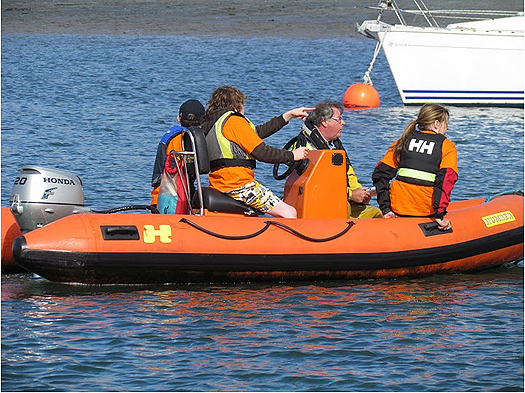
Negotiating the tasks on the Royal Cork RIB course. Photo: Matt McRory
This Regional Final saw the ISA introduce a new format for the competition. Each Team had to carry out 10 tasks in a 3 hour period. These tasks consisted of "on the water maneuvering" of their craft and some off the water activities such as "rescue line throwing, Knots and various questions on all aspects of boating".
For the 3 hour period you could feel the tension as all teams went from task to task, when the time was up ISA RDO Ciaran Murphy had the task of adding up the scores. Throughout the day the high scores in each competition differed with no Team showing dominance. In the end it was a tight affaire and the Top Six were:
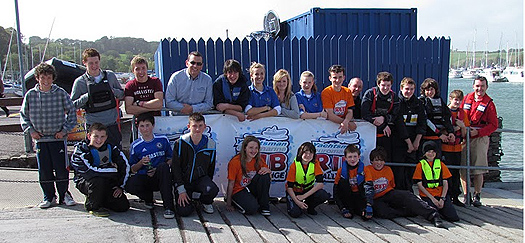
RIB Competitors at Royal Cork
1st Place – Foynes 1
2nd Place – Foynes 2
3rd Place – Royal Cork Yacht Club
4th Place – Glandore Harbour Yacht Club
5th Place - Atlantic Sailing Club
6th Place – Sailing Academy of Ireland
The top four teams now qualify through to the National Final where they have a chance of winning the ISA Yachtsman euromarine Rib Challenge 2011 top prize of a Club Rib.
Ex Sailing Chief Lashes 'Grandiose' Dun Laoghaire Harbour Plan
A former Irish Sailing Chief has added his voice to the growing concerns of sailors in Dun Laoghaire to a recently published Harbour Masterplan that Waterfront Yacht Clubs say threatens sailing in the port, Ireland's biggest sailing centre.
The plans, along with the loss of the winter ferry service from the port were featured on RTE News this week.
The Harbour company, who published the designs last month, say the masterplan can create 'a thousand jobs' but a former Irish Sailing Association (ISA) President, Roger Bannon has blasted both the plan and a supporting promotional video (below) as 'grandiose nonsense'.
"The Masterplan will position Dun Laoghaire Harbour as a marine, leisure and tourism destination of international calibre", says Gerry Dunne, Chief Executive Officer, Dun Laoghaire Harbour Company.
"We need to spend an average of €5m a year on maintaining and developing the Harbour infrastructure. The Masterplan will involve investment of more than €230m, over the next 10-15 years and will result in 1000 sustainable jobs in areas such as tourism, marine service companies, select retail, and food and beverage." says the CEO.
But Bannon, a Dun Laoghaire sailing champion, says a plan is needed but the focus instead should be on something a lot more realistic.
"Sure we want a development plan for Dun laoghaire and its Harbour but let's look at something realistic and practical over a 10 year period which we know will work and stay away from this impossible grandiose nonsense.
Mr Leo Varadkar, T.D., Minister for Transport, Tourism and Sport visited the Harbour Board in June to view the Masterplan model and the plans.
During the visit the Minister said he was aware of the very keen local interest in the future development of the harbour. The yacht clubs, who occupy 50% of the harbour waterfront, say the future of the harbour is in marine lesiure.
Bannon's full comments are below:
"What a load of aspirational twaddle. High on sweeping statements and low on specifics. Sounds more like a plan to occupy people in highly paid jobs while nothing will ever happen.
Sure we want a development plan for Dun laoghaire and its Harbour but let's look at something realistic and practical over a 10 year period which we know will work and stay away from this impossible grandiose nonsense.
There are plenty of examples of cost effective developments in many cities around the world, such as Vancouver and Boston, where marine facilities and other resources similar to Dun laogahire have been brilliantly exploited for the general benefit of everyone.
Heaven forbid that our public servants might learn something from others facing the same dilemma elsewhere in the world. Should someone tell the Harbour Board that counting on residential development to generate funding may not work?
Finally, I do not understand how the Harbour Board can take it upon itself to come up with such a plan without integration with local planning for the whole of Dun Laoghaire. Was the video made by DreamWorks?"
Powerboat Racing's 'America's Cup' Returns to Cork
Plans are afoot to bring powerboat racing's Harmsworth Trophy event to Cork in 2014 - over 100 years since Cork Harbour hosted the first ever edition of the race. SCROLL DOWN FOR ARCHIVE Footage.
Regarded as the powerboat version of yachting's America's Cup, the first Harmsworth Trophy was won in July 1903 by Napier, which was allegedly piloted by women's world land speed record holder Dorothy Lewitt.
According to the Tom MacSweeney column in the Evening Echo, a consortium is hard at work to bring the race back to its birthplace - coinciding with the Round Ireland Powerboat Race, which will also be held out of Cork in 2014.
Denis Dillon of the Irish Sailing Association commented: "There is a group of Cork enthusiasts interested and is trying to put a consortium together that would also bring back one of the original 1903 boats still is existance which is in the USA.
"It came first in its class and second overall in the race in 1903 and they hope to bring it back for the 2014 race."
Irish Sailing Association Hits Out at Newstalk Interview
The Irish Sailing Association (ISA) has hit back at last week's Newstalk radio interview where questions over the state funding of Irish Olympic Sailing was raised.
In the interview with a number of Olympic hopefuls, including Dun Laoghaire sailor Annalise Murphy, presenter Ivan Yates asked if the tax payer was 'getting value for money' by supporting minority sports such as sailing.
More strident than other sports, Olymic sailing manager James O'Callaghan has said sailing is determined to stand on the podium in the 2012 Olympics. The Association is targetting three boats for the Olympic regatta at Weymouth next July.
In a lengthy written response sent to the station the sailing body has said it was wrong for the interviewer to ' target the hardworking athletes' and concludes that 'it was a shame Yates decided to take the negative line with these young people".
The Newstalk questions come as Sports Council funding is expected to be cut and at an important stage in the planning for the London 2012 regatta but it also comes at a time when questions are being asked internationally about the future of sailing at the Olympics.
"If banks and commercial institutions had applied the same kind of rigorous criteria the athletes have to achieve before even seeing one red cent, it is likely that we would have a much stronger nation", the ISA statement says.
Irish sailors received €186,000 in state funding in 2010 through the Irish Sports Council's high performance programme. This season – the best for many years – Ireland has scored some top Olympic class results, an indication, say the ISA, that the hard work is paying off.
In the course of the interview 21-year old Murphy told Yates she will need to supplement her state grant of €40,000 grant with donations and support from her family.In further probing about how campaigns are funded Yates maintained that a minorty sport such as Olympic sailing would only be 'a footnote on the Nine O'Clock news' during next year's Olympics and questioned the merit of funding the sport through the public purse.
It's not the first time the radio station has raised the issue of the relevance of sailing. On May 23rd on the station's morning talk show the presenter asked Olympic Council (OCI) of Ireland Chief Pat Hickey, “Does anyone care, does it matter if Ireland wins a sailing medal in the Olympics … it’s a minority sport....?"The ISA response to the latest interview (published on its Olympic facebook page) is in full below:
"It is rare that we respond to public comment but the tone of Ivan Yates interview yesterday on Newstalk with Annalise and a number of other athletes needs a response. Here is what we emailed Newstalk:
Thanks to George for bringing in a bit of balance to the completely lopsided interview that Ivan Yates conducted yesterday morning. (George Hook took Ivan to task later the same day on his show The Right Hook)
To target the hardworking athletes for wasting taxpayers money was completely unfair and was just trying to appeal to the high level of frustration out there with the state the country is in at the moment. While this frustration is justified to make the athletes the target is not.
They are not the ones wasting tax payers money. In the overall scheme of things the funding the sports council gets each year from government is a drop in the ocean (approx. 50-60million) in terms of the overall budget spend and it is still one of the smallest developed country allocations to sport.
If banks and commercial institutions had applied the same kind of rigorous criteria the athletes have to achieve before even seeing one red cent, it is likely that we would have a much stronger nation. Every sport has to apply annually for the Irish Sports Council funding and the application is assessed on objective criteria primarily based around performance targets. If you hit targets you get support, simple as that.
No Olympic athlete I know is "making" money they are just about getting enough in to cover their costs of campaigning. The athletes all approach their sport in a wholly professional manner most are doing it full-time but every piece of grant aid or support they receive goes into their campaign, they are not building up property portfolios or taking out mortgages.
What they are doing is representing Ireland on the international stage and the athletes success reflects well on the nation. Ireland competing on the international stage also strengthens our case for hosting international events which not only showcase Ireland as a destination but also generates significant income for the local economy. The Volvo Ocean race brought in €55m in economic benefit to the West of Ireland when Galway hosted one of the stopovers.
If we all subscribed to Ivan's narrow view of the world we would all end up being couch potatoes watching sport on TV taking place in foreign countries and costing the tax payer a hell of a lot more money trying to solve the problems a sedentary lifestyle would bring to bear on the health system.
It is a shame Yates decided to take the negative line with these young people who inspire 100's of kids within their own sports and potentially will have an even wider impact if successful at the Olympic games. We should be cheering on these athletes and getting behind them not trying to pull the rug from underneath them while attempting to make amends for the errors of others" - Friday, 19 August 2011.
More related Olympic sailing articles:
Olympic Sailing - Are Two Medals a Realistic Expectation?
Irish Youth Lasers Compete in La Rochelle
In La Rochelle, France Ross Vaughan lies 82nd in a fleet of 132 at the European Laser Radial Mens Championships. Over 300 Lasers started their World Championships off La Rochelle yesterday in sunshine, a 20-25 kn breeze and a big swell.
Vaughan is a former member of Ireland's ISA Academy Squad who are all competing at the youth radial championships that start tomorrow at the same venue.
The Squad will also be joined by Finn Lynch and Fionn Lyden who the ISA say are on 'a six month probation period for entry into the Academy'. The 147 Standard-Youth sailor fleet is split in three groups.
After the first days racing in the Mens competition Sam Meech NZL is leading followed by Martin Evans GBR (5/1) and Francebesco Marrai ITA (2/5). Follow here.
Chris Penny also competed in the Standard Youth World and European Championships and finished 44th in the Europeans and 64th in the Worlds.


























